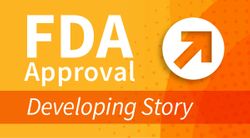- About Us
- Advertise / Support
- Contact
- CancerNetwork.com
- TargetedOnc.com
- OncLive.com
- OncNursingNews.com
- Terms & Conditions
- Privacy
- Do Not Sell My Information
© 2025 MJH Life Sciences™ and CURE - Oncology & Cancer News for Patients & Caregivers. All rights reserved.
Mortality From COVID-19 Increases in Patients Receiving Systemic Cancer Treatments
In an interview with CURE®, Dr. Trisha Wise-Draper discusses new findings that show an increased mortality risk for patients with cancer receiving systemic treatments who subsequently contracted COVID-19.
In an analysis of 3,920 patients with cancer who contracted COVID-19, 30-day mortality was highest among patients treated one to three months prior to their COVID-19 diagnosis with chemoimmunotherapy. Mortality was at 29% in this group compared to others, according to research presented at the 2020 European Society of Medical Oncology Virtual conference.
In comparison, 30-day mortality by most recent treatment type was 20% in chemotherapy, 18% in immunotherapy, 17% chemoradiotherapy, 20% for targeted therapy and 11% for endocrine therapy. Mortality in patients who received chemoimmunotherapy also increased the sooner treatment was received in relation to the COVID-19 diagnosis.
This data was presented by researchers working with the COVID-19 and Cancer Consortium, a group of oncologists and researchers that share data online to look at the impact of COVID-19 and cancer, at ESMO by lead author of the study Dr. Trisha Wise-Draper. Wise-Draper, associate professor of hematology oncology and internal medicine at the University of Cincinnati Cancer Center and medical director of their cancer clinical trials office, took the time to discuss with CURE® the implications of this study and what patients need to know about their treatments in relation to COVID-19.
CURE®: Could you explain what you and the authors of the study meant by systemic treatment?
Wise-Draper: We looked at a lot of different factors. So, we looked at did the patients get treatment in two weeks, did they get treatment within two to four weeks prior to getting the COVID-19 infection? Did they get treated within one to three months, or did they get treated in the last year, and we compared the patients who had required treatment in those timeframes to patients who had not received treatment in the last year. So, patients who had not received any kind of treatment in the last year would have been probably in remission or cured of their disease.
Even in that group, there was an increased risk of mortality, which was concerning, but when I'm talking about systemic treatments, we're talking about chemotherapy and we also looked at radiation, although that's not a systemic treatment, but it was mostly looking at chemotherapy, immunotherapy activating your immune system to fight the cancer, targeted agents as well as hormonal, anti-hormonals that we would use for breast and prostate cancer.
Can you explain why mortality had increased in the chemoimmunotherapy group in this study?
We don't know for sure, it would all be hypothesis-generating on why mortality increased. But the concern is that if you give chemotherapy you will decrease someone's immune system and so maybe they wouldn't have the type of immune cells you need to fight off the infection. When we first went into this, there were a lot of hypotheses as well as some smaller reports.
One of them being that immunotherapy; if you activate your immune system, then you might be more susceptible to cytokine storm, which is an over activation of the immune system causing the complications in COVID-19. And that we're still investigating that, but interestingly, immunotherapy alone or at least checkpoint inhibitors did not increase risk of mortality.
It was chemotherapy as well as targeted agents that cause you to deplete your B cells specifically, like rituximab (Rituxan) that actually had the worst mortality. So, the thought process there is if you don't have the proper immune cells to fight off the virus, because the immune cells that you need to fight out viruses are the same immune cells you need to fight off cancer. And so, if you don't have those immune cells, then you might be more susceptible to viruses.
Is there a concern that patients may have to discontinue treatment depending on their risk for COVID-19 infection?
No. And I would say that, that is one of our fears that patients would see this as a reason not to get treatment. And I want to be clear about that, because it's cancer unfortunately, has 100% mortality. So, no matter what your increased mortality risk is, with COVID-19 it's still higher with cancer. So, we definitely still need to give treatment to these patients, we just need to be more cognizant, and understanding that they are at an increased risk, and that these patients need to take even more precautions than the general public. No going into crowds, making sure they wear their masks, let other people do some things for them, like going to the store.
We really need to protect this population, because if they do get the virus, they're more likely to have adverse outcomes, but not treating the cancer is really not an option. In some situations where maybe the cancer is growing slowly, we could modify treatment. But for those that the cancer (is) either growing quickly, or we have curative treatment available for the cancer, we don't want to hold on that.
What other treatments investigated in this study seemed concerning when it came to increased mortality?
The other big one that was a concern is that targeted agents, the rituximab, or CD20 depleting antibodies. So that was actually the highest risk group we saw, and that goes along the same lines of if you deplete your immune cells, then it puts you more at risk. Interestingly, endocrine therapies that we might give for breast cancer or prostate cancer, did not put you at increased risk, and in fact, even seemed to be a little bit protective in our data, but we don't quite understand why that is the case. But it did appear that they actually had a decreased risk, and it might be just because of our comparison group. But nevertheless, they seem to be protective.
For more news on cancer updates, research and education, don’t forget to subscribe to CURE®’s newsletters here.
Related Content:



